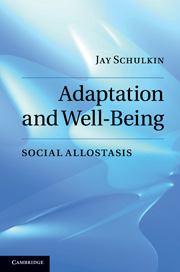Book contents
- Frontmatter
- Contents
- Preface
- Introduction
- 1 Evolutionary Perspectives and Hominoid Expression
- 2 Cognitive Competence and Cortical Evolution
- 3 A Window into the Brain
- 4 Chemical Messengers and the Physiology of Change and Adaptation
- 5 Social Neuroendocrinology
- 6 Cephalic Adaptation: Incentives and Devolution
- 7 Neocortex, Amygdala, Prosocial Behaviors
- Conclusion: Evolution, Social Allostasis and Well-Being
- References
- Index
5 - Social Neuroendocrinology
Published online by Cambridge University Press: 18 April 2011
- Frontmatter
- Contents
- Preface
- Introduction
- 1 Evolutionary Perspectives and Hominoid Expression
- 2 Cognitive Competence and Cortical Evolution
- 3 A Window into the Brain
- 4 Chemical Messengers and the Physiology of Change and Adaptation
- 5 Social Neuroendocrinology
- 6 Cephalic Adaptation: Incentives and Devolution
- 7 Neocortex, Amygdala, Prosocial Behaviors
- Conclusion: Evolution, Social Allostasis and Well-Being
- References
- Index
Summary
INTRODUCTION
One feature that underlies cephalic regulation of behavior is the diverse social cues for approach and avoidance. The greater the sophisticated social context, the larger the cognitive/behavioral strategies to draw upon (Byrne and Bates, 2007). Behavioral approach and avoidance are both cognitively and affectively driven; all neural systems are rich in information processing, and therefore cephalic adaptation of all sorts is cognitive in nature. The issue is not really cognitive versus not cognitive, but how flexible, labile and adaptive the systems are (Gallistel, 1980).
In this chapter, I underscore the diverse information molecules that underlie adapting change or allostasis. Many of them reflect feedforward systems: steroids facilitating neuropeptide expression, adapting and coping with social change or social stability (Herbert and Schulkin, 2002). The chapter begins with a theme broached in the last chapter with regard to organization and structural changes in the brain that underlie diverse forms of social behavior, followed by a discussion of appetitive and consummatory motivated behaviors essential for successful social behavioral adaptations. I begin first with a discussion of appetitive and consummatory concepts, followed by describing socially related phenomenon.
APPETITIVE AND CONSUMMATORY BEHAVIORS
Just what are they? An early description by Craig (1918) depicted diverse appetitive approach behaviors, and consummatory behaviors in diverse species; central states of the brain underlie the search engine and the consummatory phase of motivation (Stellar, 1954). The motivation for rewards pervades ecological space.
- Type
- Chapter
- Information
- Adaptation and Well-BeingSocial Allostasis, pp. 95 - 124Publisher: Cambridge University PressPrint publication year: 2011



